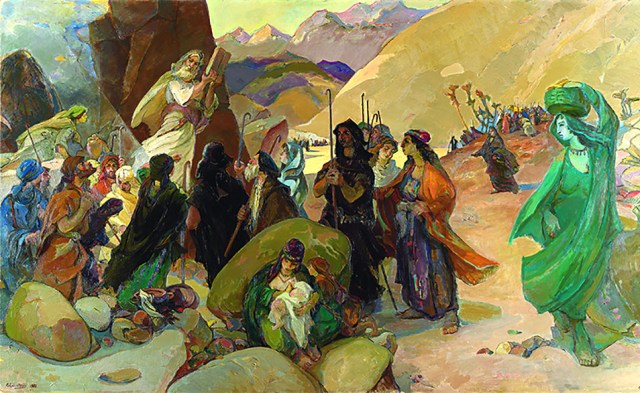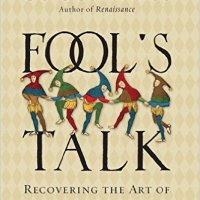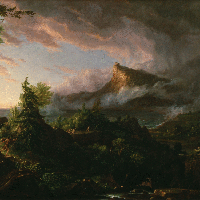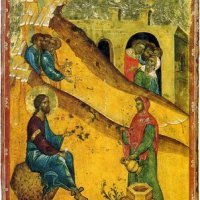 How the OT should be interpreted and applied is a fascinating topic that is highly relevant to discipleship in the church. Scripture is our discipleship handbook. Those familiar with the stories of OT Israel, especially the ones where the stakes were life and death, find relief that we don’t live during those times. Such relief is good, but it can be misguided—as if the God of the OT was strict and harsh, but he lightened up with grace in the NT which relaxes his demands upon Christians. Our age is more spiritually beneficial, but the lessons we ought to grasp from the OT expect more of us, not less.
How the OT should be interpreted and applied is a fascinating topic that is highly relevant to discipleship in the church. Scripture is our discipleship handbook. Those familiar with the stories of OT Israel, especially the ones where the stakes were life and death, find relief that we don’t live during those times. Such relief is good, but it can be misguided—as if the God of the OT was strict and harsh, but he lightened up with grace in the NT which relaxes his demands upon Christians. Our age is more spiritually beneficial, but the lessons we ought to grasp from the OT expect more of us, not less.
Since Christians are no longer under law but under grace, is it true that we can continue in sin that grace and love and freedom may abound to us (Rom 6)? Why can’t I have Jesus as Savior but not Lord? Here a Bible passage in 1 Corinthians 10:1-15 can help us. It teaches:
The NT church reflected on the OT wilderness stories of God judging his people Israel who tested Christ. As disciples let us beware similar temptations to sin, heed the warnings meant for us, and escape spiritual destruction by fleeing all idolatry and running to Christ who will provide us escape by way of endurance.
In this passage the apostle Paul sets forth a series of warnings from Israel’s past for the Corinthian church regarding that congregation’s particular sins. These warnings serve as “types” that use stories from the books of Moses as spiritual instruction (torah) by way of typology (the NT method of interpretation that shows, by divine intention, all OT symbolic examples point forward to the thing symbolized). We must read these OT wilderness stories as ultimately about Jesus Christ and his gospel.
Disciples are Made in a Community of Learning
United with OT Israel by our shared spiritual experiences of being led by Christ (vv. 1-4)
It’s often the case that Christians sense a great chasm between the experiences of the church and ancient Israel. If the early church seems strange and such a long time ago (2000 years) during the height of the Roman Empire, the birth and infancy of Israel as a nation feels almost completely foreign to our experience 3400 years later. But the Bible teaches Christians have the most important thing in common with ancient Israel—our shared Lord and Savior Jesus Christ. How so?
As a Christian, do you know you have come under the Lord’s protection and guidance? Israel as our fathers in the faith were all under the Lord’s cloudy appearing of smoke and fire. Did you pass by faith through Christ’s cross as the Lord transferred you from bondage to sin through death to self and into life and freedom? Israel also passed through the sea in the exodus. Have you entered the covenant community through baptism into the name of your Deliverer, and do you find spiritual sustenance by partaking of the sacrament of the Lord’s Supper, eating and drinking the sacramental elements of Christ’s body and blood as you feed by faith on Jesus? So did Israel, having been “baptized” into Moses through the cloud and sea, and having shared in the same spiritual food and drink which the Scripture identifies as Christ present with them.
When you let our shared spiritual experiences with ancient Israel sink into your understanding of the Bible, then you won’t separate the Church and Israel as “us and them.” Rather, you’ll discover new meaning in the OT and the whole Bible will become personally yours and corporately ours in ways you never imagined before. Just as the LORD led Israel out of bondage in Egypt, to the holy mountain to meet him, to be organized and adopted as God’s people, and then taught his holy laws, so also this pattern is fulfilled in the Lord’s leading his Church. In both cases, for Israel and the Church, God’s design is to make disciples in a community of learning as we experience and follow Christ together.
United by the realization that the church is more like sinful Israel than we admit (vv. 5-6)
Perhaps the second most important thing any church member will ever learn (the first being the gospel that calls sinners to repent and believe in Jesus Christ for forgiveness and eternal life), is this: we are the new Israel. What that means first is that we are very much like OT Israel. Many Christians consult their theology and can agree in principle, “Sure, I buy that—the church is like Israel, just in new covenant form.” But what church members often do not realize is that we are way more like sinful Israel than we dare to admit. This is the precise point Paul makes in addressing the Corinthian church in verses 5 and 6.
We tend to read with a “them not us” framework, that God was not pleased with most of that generation of Israelites in the wilderness before they entered the Promised Land, and thus were overthrown (literally “laid low” or “killed”) by the LORD. But Paul had just explained to us church members in verses 1-4 that “them are us.” Thus it follows, when you consider the implications of “them are us,” that if God was so displeased with Israel’s sin in the wilderness that he killed them off to prevent an entire generation (save the faithful spies Joshua and Caleb) from entering the land to receive their inheritance, then similarly God must not be pleased with the church’s sin either.
Someone will object, “Well we are the NT church that is no longer under the OT law, so it’s different for us.” Then consider verse 6 that explains the relationship members of the visible church should have with these OT wilderness stories of Israel. All those spiritual experiences the church shares with Israel happened as examples for us so we might not desire evil as they did. Stories of Israel’s evil deeds, as recorded by Moses, under the inspiration and guidance of the Holy Spirit, are meant to function as morality tales for us. As torah, it is spiritual instruction that points symbolically to Christ, our need of him, and how we must relate to him. The whole Bible is ours!
Whatever truth and application we can draw from such OT examples must be brought over from OT to NT through the lenses of Christ and the gospel. That’s essentially the apostolic method of biblical typology—figuring out how these things took place as Christian examples for us so we won’t desire evil and fall into the same wilderness traps when tested by God as his disciples learning together in community. We learn how to live as Christians when we believe and interpret and apply the Bible together, and then deal with our particular sin problems together.
Disciples are Made in a Wilderness of Testing
Temptations to indulge idolatries while presuming a right standing before God (vv. 7-10)
From a macro-perspective, the Bible presents three representative “sons of God.” Most people rightly identify Jesus as the Son of God (1 Cor 1:9), and with a bit of reflect can guess Adam as the first “son of God” (Lk 3:38). But we sometimes overlook Israel as God’s son (Hos 11:1). All three of God’s “sons” endured a probationary period of testing to confirm their covenant obedience as spiritually mature sons of God who prove themselves ready to receive their promised inheritance. For Adam, his testing was in the Garden of Eden. But for Israel and Christ, they were both tested in the wilderness. In all three instances, such testing involved temptations to sin against the LORD.
Paul mentions, without going into the sordid details, four incidents when Israel fell into temptation to indulge various kinds of idolatries despite their presuming a right standing before God. It is significant that all these examples are from Israel’s wilderness wandering years because in the Bible “wilderness” is the place of testing where God’s people prove the genuineness of their faith and loyalty.
In verse 7 Paul quotes from the abominable golden calf episode. While Moses was absent from Israel’s base camp because he was on the mountain receiving the law from God, the people gave up on Moses ever returning and pressured their high priest Aaron to forge a gold calf idol to aid them in religious devotion. Israel’s sin was crass idolatry: bringing offerings, partaking of a ritual meal in the presence of an idol, then arising in pagan revelry to “play,” probably in debauched sexual behavior (Ex 32:6).
The second idolatrous incident was when Israel worshiped the Baal of Peor by offering sacrifices and fornicating with the Moabite women. God’s anger was so kindled he killed in one day more than 23,000 offending Israelites in a plague with also public executions (Num 25:1-9).
In the third account of idolatry, some Israelites put Christ to the test when they rejected the authority of the LORD and his servant Moses (Num 21:4-9). After their spiritual insubordination in complaining about the shortage of food and water, God sent poisonous snakes to bite and kill them. And to instruct Israel they must trust and submit to his Lordship, God had Moses make a bronze serpent on a pole that would heal anyone who looked at it with repentance and faith.
Paul alluded to a fourth wilderness story when Israel expressed ingratitude through grumbling (Num 14). They murmured and complained and grumbled and rebelled against Moses and Aaron for fear of being trounced in battle against the Canaanite giants. Israel grumbled to go back to Egypt for lack of faith in God’s salvation. God promised them possession of an exceedingly good land flowing with milk and honey—the land of their fathers Abraham, Isaac, and Jacob. But since they preferred the unthankful, faithless option of returning to bondage in Egypt, God sent again the destroying angel to slowly kill them off in the wilderness over the next 40 years (Num 14:29-37).
In response to citing all four of these terrible stories of Israel’s idolatry during their wilderness years, Paul tells the disciples in Corinth, “Don’t be like them!” Don’t be idolaters. Don’t be sexually immoral. Don’t be insubordinate to God’s authority and leadership. Don’t grumble and complain against the Lord’s generosity and promise that require faith and obedience. Don’t yield to such temptations because they lead to God’s wrath that produces death. And don’t presume the church is in a totally different situation.
Our right standing before God in Christ, standing not by obedience but by his grace alone, can only be presumed if we give evidence in our lives of resisting temptation, trusting Christ, and walking in our wilderness of testing by repentance and faith. If instead we show ourselves more like the wicked, idolatrous Israelites, then we wrongly presume our right standing before God.
In Paul Barnett’s commentary on 1 Corinthians, he writes this:
The God of the Christians is the same God as the Lord of the Israelites. His acts of judgment then prefigure and confirm his displeasure now whenever his people sin in similar ways. God will always judge the worship of idols, fornication, testing Christ and grumbling against apostolic teaching. To be sure, that judgment may not be as physical and dramatic as that which fell upon the exodus pilgrims. Rather, it may take a spiritual form as people are quietly cut off spiritually from the source of their life in Christ. His judgment is that we will simply stop ‘knowing’ him. But it is a more severe judgment, because it is not merely the judgment of death, but an eternal judgment.
Testings to increase endurance without assuming an infallible standing before sin (v. 12)
However, praise the LORD for his grace and wisdom. Wilderness testings are not meant to make us more susceptible to our evil desires so we’ll more likely fall into temptation to sin. Rather the wilderness is designed to be a place of training and strengthening of our faith. Paul states the wilderness principle in verse 12: let anyone who thinks that he stands take heed lest he fall. In other words: know thyself, including your strengths, weaknesses, temptations, and how you might gain victory in Christ.
The younger generation of Israelites left Egypt as child slaves who knew nothing of God, godliness, or faith. As they grew up in the wilderness, God prepared them to be an army that took the Promised Land by storm under the Lord’s leading. David retreated to the wilderness and King Saul hunted him for years. During his wilderness wandering David became the chief psalmist, learned to trust God and be at peace in the midst of life’s tribulations, and grew into his divine anointing as the future king of Jerusalem.
It is a truism that no one really grows spiritually in their ability to resist temptation without testing through trial. That’s why God ordains the wilderness experiences in your life—to strip you of any false assurance that you are strong enough to handle life without Jesus. Because once you can sincerely confess, “I would certainly fall just as hard as my fathers and mothers, the wicked Israelites, if God doesn’t deliver me from temptation by his strengthening grace in Christ,” only then will the wilderness be for you a blessing not a curse.
Once my church hosted Messianic Jew Ariel Berkowitz, the sibling of one of our Jewish church members, to give a weekend seminar on the Torah as uniquely valuable spiritual instruction for Christians. What was most striking to us Gentile believers was how Israel’s wilderness stories closely connect to our experiences as modern-day church members. His photo slides of Israel’s Negev region (the low-lying desert in the far south) helped us understand why grumbling about food and water was a temptation, and how easy it would be to give up on God’s promise when you’re literally in outdoor survival mode with your family.
We think our faith is strong—so did Israel! So God in his wisdom used the wilderness to bring them to their knees to test faith, expose faithlessness, confront and discipline idolatry, and increase Israel’s endurance for their own good and for God’s glory. Then from the Torah our seminar host set Scripture after Scripture before us to help us see that Christ really is the Bread of Life, the Serpent on the Pole, the Living Stream in the Desert, the Divine Lawgiver on the mountain, the Anointed Deliverer from bondage, and the God who puts us our faith to the test in the wilderness. Because disciples are truly made in the wilderness of testing.
Disciples are Made on the Brink of Eternity
Think like a Christian! Scripture is written to steer us from eternal destruction to life (v. 11)
Recently I was in a stimulating discussion about how we should think about the generation of Israelites who died in the wilderness. Were they essentially believers who received “tough love” from God when not allowed to cross the Jordan River into the land of promise? That would include Moses himself, disciplined for one tragic sin of striking the rock when God commanded him to speak to it for water to flow. It even says in one place that God pardoned their sin (Num 14:20-24). So were the fallen Israelites laid low in the wilderness actually forgiven believers who we will meet someday in heaven? Or were those Israelites who committed various forms of idolatry (false worship, sexual immorality, insubordination, faithless fear) tested and exposed as wicked pretenders (false brothers), judged for their sins, and destroyed outside the Promised Land of salvation?
In one sense, the fact that their stories are examples for us, actually written down for the church (God’s people who live at the end of the ages) means the question of what is the eternal destiny of this or that Israelite is not really the question we’re supposed to ask. After all, I don’t know of anything in Scripture that suggests Moses is not a great saint experiencing heavenly rest right now. So God barring Moses’ entrance to the Promised Land must mean something different—at least from what we are to apply to ourselves from the example of Moses.
Remember the wilderness stories are examples (types) that symbolize something greater. Since Israel’s wilderness symbolizes the realm of testing between deliverance from sin (bondage in Egypt) and heavenly rest (the inherited land of Canaan), then the lesson Christians should glean from these stories is they are written to guide us to eternal life that we might escape eternal destruction. To put it bluntly, in our wilderness of testing we live on the brink of heaven and hell. Eternal life and eternal destruction.
Will you be carried away to hell by temptation to idolatries, even as we experience God’s cloud of protection and guidance, share in the sacraments of baptism and the Lord’s Supper—just like the Israelites in the wilderness?
Or will you be led to heaven by Christ’s testings and refinements of our faith, while we also share the spiritual experiences with Israel of deliverance and sacraments, but laying hold of Christ by faith to share not merely in the symbol but in the Lord and his gospel symbolized?
Think! Think like a Christian! Read the OT like a Christian. Reflect on the Torah (in this case on Israel’s wilderness stories) so God’s Spirit might steer you away from destruction and to eternal life. 1 Corinthians 10 is calling you to think like a Christian, recognizing and accepting that for us, upon whom the end of the ages has come, the stakes are not less than in the OT—as if we’re not under law but under grace, so that gives us a license to sin and not strive for holiness. By no means! In the new covenant the stakes are raised to the eternal degree. Disciples even more so now are made on the brink of heaven and hell.
Act like a Christian! Flee from idolatry and follow Christ the spiritual Rock (vv. 4, 14-15)
Therefore you and I must act like Christians who truly have been saved by grace, delivered from sin, and created for faith and holiness and works of righteousness. We must act like Christians in the face of temptation to pass the test. Paul gives us a negative and positive assignment to grow as disciples together.
Negatively, he urges you to flee from idolatry. Obviously living idol-free requires not fashioning an object or imagining something to worship it besides the Triune God himself. But fleeing from idolatry involves repenting of, and avoiding from now on, the kinds of sins Paul noted in his list of select stories from Israel’s wilderness years. He could have cited more. We should expand the “types” from the wilderness that can serve as examples for faith lessons to include the scope of the whole Bible.
In the OT, Joseph was tempted by Potiphar his master’s wife to sleep with her, and he literally fled with his robe in her hands when she grabbed it (Gen 39:11-12). In the NT, Paul instructed his protégé pastor Timothy to flee youthful passions (2 Tim 2:22a)—advice in line with what he wrote for the Corinthians (1 Cor 6:18-20).
So the negative action for Christians facing temptation on the brink of heaven and hell is to flee from various kinds of idolatries. Just remove yourself from people and situations that may compromise your integrity.
Positively, the best way to flee temptation is to simultaneously flee to Christ. Jesus is the same spiritual Rock that “followed” Israel in the wilderness, providing them at the beginning and the end of their 40-year sojourn with living water to quench their physical and spiritual thirst. After his instruction to flee youthful passions, Paul says “pursue righteousness, faith, love, and peace, along with those who call on the Lord from a pure heart” (2 Tim 2:22b). To follow Christ the spiritual Rock involves pursuing him by faith, putting your faith in his saving work on the cross to die for your sins to forgive you, and in his rising from the dead to share his resurrection life with you.
To pursue righteousness, faith, love, and peace is to gain all these things when as a first priority you pursue Christ and his kingdom. Seek ye first the kingdom of God and his righteousness—the justification that we gain from him by receiving it through faith alone—and all these other things will be added unto you (Mt 6:33). And don’t forget to pursue Christ the spiritual Rock with other disciples who are also calling on the Lord from a pure heart. Disciples are made on the brink of heaven and hell, in the wilderness of testing, and always and forever in a community of learning.
Where are disciples made? At every place disciples find themselves helping others take one more step toward Christ—and the most important place disciple-making happens is in the regular corporate gathering together of the local church. In the worship service was where the Corinthians heard together Paul’s instructions, and in our local gatherings is where God has ordained as the primary place to make disciples.
So maximize and prioritize your time on Sundays to gather with the local body of believers. By God’s design you’ll take significant steps toward Christ while gathered with your church for the teaching of God’s Word, fellowship with Christians, sharing in the Lord’s Supper, and participating in the prayers (Acts 2:42). All aided by the simple fact that we’re gathered together on the Lord’s Day in a community of learning, in the wilderness of testing, and on the brink of heaven and hell. Amen.
Resources
Sermon handout & commentary on 1 Corinthians 10:1-15
Sermon audio download













